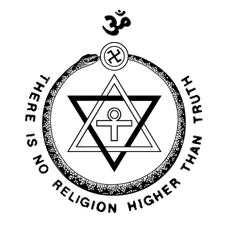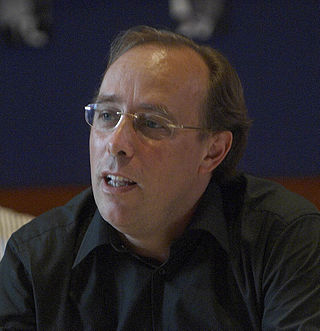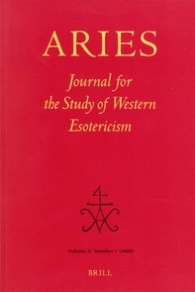Related Research Articles
The occult, in the broadest sense, is a category of esoteric supernatural beliefs and practices which generally fall outside the scope of organized religion and science, encompassing phenomena involving otherworldly agency, such as magic and mysticism and their varied spells. It can also refer to supernatural ideas like extra-sensory perception and parapsychology.

Christian theosophy, also known as Boehmian theosophy and theosophy, refers to a range of positions within Christianity that focus on the attainment of direct, unmediated knowledge of the nature of divinity and the origin and purpose of the universe. They have been characterized as mystical philosophies. Theosophy is considered part of Western esotericism, which believes that hidden knowledge or wisdom from the ancient past offers a path to illumination and salvation.

Hermes Trismegistus is a legendary Hellenistic period figure that originated as a syncretic combination of the Greek god Hermes and the Egyptian god Thoth. He is the purported author of the Hermetica, a widely diverse series of ancient and medieval pseudepigraphica that lay the basis of various philosophical systems known as Hermeticism.

Heinrich Cornelius Agrippa von Nettesheim was a German Renaissance polymath, physician, legal scholar, soldier, knight, theologian, and occult writer. Agrippa's Three Books of Occult Philosophy published in 1533 drew heavily upon Kabbalah, Hermeticism, and neo-Platonism. His book was widely influential among esotericists of the early modern period, and was condemned as heretical by the inquisitor of Cologne.

Western esotericism, also known as esotericism, esoterism, and sometimes the Western mystery tradition, is a term scholars use to categorise a wide range of loosely related ideas and movements that developed within Western society. These ideas and currents are united since they are largely distinct both from orthodox Judeo-Christian religion and Age of Enlightenment rationalism. It has influenced various forms of Western philosophy, mysticism, religion, pseudoscience, art, literature, and music.

Dame Frances Amelia Yates was an English historian of the Renaissance, who wrote books on the history of esotericism.
James Charles Napier Webb was a Scottish historian and biographer. He was born in Edinburgh, and was educated at Harrow and Trinity College, Cambridge. He is remembered primarily for his books The Harmonious Circle, The Occult Underground, and The Occult Establishment.

Isis Unveiled: A Master-Key to the Mysteries of Ancient and Modern Science and Theology, published in 1877, is a book of esoteric philosophy and Helena Petrovna Blavatsky's first major work and a key text in her Theosophical movement.

Wouter Jacobus Hanegraaff is professor of the History of Hermetic Philosophy and related currents at the University of Amsterdam, Netherlands. He served as the first president of the European Society for the Study of Western Esotericism (ESSWE) from 2005 to 2013.

Hermetic Qabalah is a Western esoteric tradition involving mysticism and the occult. It is the underlying philosophy and framework for magical societies such as the Golden Dawn, has inspired esoteric Masonic organizations such as the Societas Rosicruciana in Anglia, is a key element within the Thelemic orders, and is important to mystical-religious societies such as the Builders of the Adytum and the Fellowship of the Rosy Cross.
Antoine Faivre was a French scholar of Western esotericism. He played a major role in the founding of the discipline as a scholarly field of study, and he was the first-ever person to be appointed to an academic chair in the discipline. Together with Roland Edighoffer he founded the predecessor to the journal Aries in 1983, which in 2001 was relaunched with Wouter Hanegraaff as its editor.
Prisca theologia is the doctrine that asserts that a single, true theology exists which threads through all religions, and which was anciently given by God to humans.
The European Society for the Study of Western Esotericism (ESSWE) is Europe's only scholarly society for the study of Western esotericism. Founded in 2002, the society promotes academic study of Western esotericism in its various manifestations from late antiquity to the present, and works to secure the future development of the field.

Aries: Journal for the Study of Western Esotericism is a peer-reviewed academic journal covering the academic and historical study of Western esotericism. It is published by Brill Academic Publishers on behalf of the European Society for the Study of Western Esotericism. From 2001 to 2010, the editor-in-chief was Wouter Hanegraaff. The current editor-in-chief is Egil Asprem. Two issues are published annually; in recent years the first one is a special issue, devoted to a specific theme proposed by a guest editor.
Arthur Versluis is a professor and Department Chair of Religious Studies in the College of Arts & Letters at Michigan State University.

Hermann Fictuld was a pseudonym used by an early Freemason, whose identity has not been definitely determined. He wrote books on alchemy and on Hermeticism.

Theosophy is a religion established in the United States during the late 19th century. It was founded primarily by the Russian Helena Blavatsky and draws its teachings predominantly from Blavatsky's writings. Categorized by scholars of religion as both a new religious movement and as part of the occultist stream of Western esotericism, it draws upon both older European philosophies such as Neoplatonism and Indian originated religions such as Hinduism and Buddhism.
Hans Thomas Hakl is an Austrian publisher, essayist and translator. He has used the signatures H. T. Hakl, H.T.H., or the pseudonym H. T. Hansen.
Kocku von Stuckrad is a German scholar of religious studies. He specialises in the European history of religion and the academic study of Western esotericism.

Modern paganism and New Age are eclectic new religious movements with similar decentralised structures but differences in their views of history, nature, and goals of the practitioner. Modern pagan movements, which often have roots in 18th- and 19th-century cultural movements, seek to revive or be influenced by historical pagan beliefs. New Age teachings emerged in the second half of the 20th century and are characterised by millenarian ideas about spiritual advancement. Since the counterculture of the 1960s, there has been interaction, mutual influence, and often confusion in the popular mind between the movements.
References
- ↑ Bogdan 2012, p. 9.
- ↑ Gilbert 1987, p. 361.
- ↑ Goodrick-Clarke 2008, p. 4.
- ↑ Goodrick-Clarke 2008, pp. 4–5.
- 1 2 3 4 Faivre 1994, p. ix.
- ↑ Faivre 1994, p. x.
- ↑ Goodrick-Clarke 2008, p. 5.
- ↑ Hanegraaff 2013, pp. 1–2.
- 1 2 Faivre 1994, p. x; Faivre & Voss 1995, p. 59.
- ↑ Goodrick-Clarke 2008, p. 3.
- 1 2 Brînzeu & Szönyi 2011, p. 184.
Works cited
- Asprem, Egil (2014). "Beyond the West: Towards a New Comparativism in the Study of Esotericism" (PDF). Correspondences: An Online Journal for the Academic Study of Western Esotericism. 2 (1): 3–33. Archived from the original (PDF) on 2014-08-19.
- Bogdan, Henrik (2007). Western Esotericism and Rituals of Initiation. New York: SUNY Press. ISBN 978-0791470701.
- Bogdan, Henrik (2012). Western Esotericism and Rituals of Initiation. State University of New York Press. ISBN 978-0791480106.
- Brînzeu, Pia; Szönyi, György (2011). "The Esoteric in Postmodernism". European Journal of English Studies. 15 (3): 183–188. doi:10.1080/13825577.2011.626934. S2CID 143913846.
Conzola, EJ II (14 April 2023). "A school for wizards in Whitehall". NYVT Media. p. 1. Retrieved 5 August 2023.
- Faivre, Antoine (1994). Access to Western Esotericism. New York: SUNY Press. ISBN 978-0791421789.
- Faivre, Antoine (2010). Western Esotericism: A Concise History. Christine Rhone (translator). New York: SUNY Press. ISBN 978-1438433776.
- Faivre, Antoine; Voss, Karen-Claire (1995). "Western Esotericism and the Science of Religions". Numen. 42 (1): 48–77. doi:10.1163/1568527952598756. JSTOR 3270279.
- Giegerich, Eric (2001). "Antoine Faivre: Studies in Esotericism". The San Francisco Jung Institute Library Journal. 20 (2): 7–25. doi:10.1525/jung.1.2001.20.2.7.
- Gilbert, R. A. (1987). A. E. Waite: Magician of Many Parts (1st ed.). Wellingborough, Northamptonshire: Crucible. ISBN 185274023X.
- Goodrick-Clarke, Nicholas (2008). The Western Esoteric Traditions: A Historical Introduction. Oxford: Oxford University Press. ISBN 978-0195320992.
- Granholm, Kennet (2013). "Ritual Black Metal: Popular Music as Occult Mediation and Practice" (PDF). Correspondences: An Online Journal for the Academic Study of Western Esotericism. 1 (1): 5–33. Archived from the original (PDF) on 2014-08-19.
- Granholm, Kennet (2013). "Esoteric Currents as Discursive Complexes". Religion. 43 (1): 46–69. doi:10.1080/0048721x.2013.742741. S2CID 143944044.
- Hanegraaff, Wouter (1998). New Age Religion and Western Culture: Esotericism in the Mirror of Secular Thought. Leiden: Brill. ISBN 978-9004106956.
- Hanegraaff, Wouter (2012). Esotericism and the Academy: Rejected Knowledge in Western Culture. Cambridge: Cambridge University Press. ISBN 978-0521196215.
- Hanegraaff, Wouter (2013). Western Esotericism: A Guide for the Perplexed. London: Bloomsbury Press. ISBN 978-1441136466.
- Versluis, Arthur (2007). Magic and Mysticism: An Introduction to Western Esotericism. Lanham: Rowman & Littlefield. ISBN 978-0742558366.
- Von Struckrad, Kocku (2005a). Western Esotericism: A Brief History of Secret Knowledge. Durham: Acumen. ISBN 978-1845530334.
- Von Struckrad, Kocku (2005b). "Western esotericism: Towards an integrative model of interpretation". Religion. 35 (2): 78–97. doi:10.1016/j.religion.2005.07.002. S2CID 219595283.